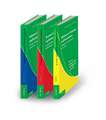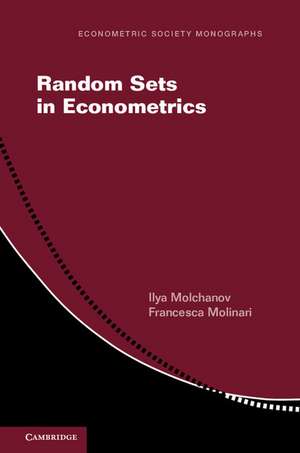Random Sets in Econometrics: Econometric Society Monographs, cartea 60
Autor Ilya Molchanov, Francesca Molinarien Limba Engleză Paperback – 4 apr 2018
Din seria Econometric Society Monographs
-
 Preț: 308.06 lei
Preț: 308.06 lei - 14%
 Preț: 2544.95 lei
Preț: 2544.95 lei -
 Preț: 294.65 lei
Preț: 294.65 lei -
 Preț: 258.04 lei
Preț: 258.04 lei -
 Preț: 441.20 lei
Preț: 441.20 lei -
 Preț: 366.95 lei
Preț: 366.95 lei -
 Preț: 287.28 lei
Preț: 287.28 lei -
 Preț: 326.53 lei
Preț: 326.53 lei -
 Preț: 371.03 lei
Preț: 371.03 lei -
 Preț: 400.76 lei
Preț: 400.76 lei -
 Preț: 348.09 lei
Preț: 348.09 lei - 11%
 Preț: 451.57 lei
Preț: 451.57 lei -
 Preț: 327.92 lei
Preț: 327.92 lei -
 Preț: 364.84 lei
Preț: 364.84 lei -
 Preț: 405.10 lei
Preț: 405.10 lei -
 Preț: 322.29 lei
Preț: 322.29 lei -
 Preț: 288.25 lei
Preț: 288.25 lei -
 Preț: 312.95 lei
Preț: 312.95 lei -
 Preț: 358.28 lei
Preț: 358.28 lei -
 Preț: 366.03 lei
Preț: 366.03 lei -
 Preț: 271.39 lei
Preț: 271.39 lei -
 Preț: 326.53 lei
Preț: 326.53 lei -
 Preț: 365.22 lei
Preț: 365.22 lei -
 Preț: 313.90 lei
Preț: 313.90 lei -
 Preț: 298.29 lei
Preț: 298.29 lei -
 Preț: 414.73 lei
Preț: 414.73 lei -
 Preț: 354.22 lei
Preț: 354.22 lei -
 Preț: 322.51 lei
Preț: 322.51 lei -
 Preț: 295.75 lei
Preț: 295.75 lei -
 Preț: 321.14 lei
Preț: 321.14 lei
Preț: 256.66 lei
Nou
Puncte Express: 385
Preț estimativ în valută:
49.13€ • 53.38$ • 41.29£
49.13€ • 53.38$ • 41.29£
Carte disponibilă
Livrare economică 31 martie-14 aprilie
Preluare comenzi: 021 569.72.76
Specificații
ISBN-13: 9781107548732
ISBN-10: 110754873X
Pagini: 194
Ilustrații: 10 b/w illus.
Dimensiuni: 153 x 228 x 13 mm
Greutate: 0.29 kg
Editura: Cambridge University Press
Colecția Cambridge University Press
Seria Econometric Society Monographs
Locul publicării:New York, United States
ISBN-10: 110754873X
Pagini: 194
Ilustrații: 10 b/w illus.
Dimensiuni: 153 x 228 x 13 mm
Greutate: 0.29 kg
Editura: Cambridge University Press
Colecția Cambridge University Press
Seria Econometric Society Monographs
Locul publicării:New York, United States
Cuprins
1. Basic concepts; 2. Selections; 3. Expectation of random sets; 4. Limit theorems for Minkowski sums; 5. Estimation and interference.
Recenzii
'The book builds upon and greatly elaborates on the pioneering, fundamental work that Arie Beresteanu, Ilya Molchanov, and Francesca Molinari did on connecting econometric models with missing data and set-valued responses - such as games with multiple equilibria - to the theory of random sets, a beautiful field of mathematics, probability theory, and mathematical economics. It should be of equal interest to students and researchers in mathematical statistics, econometrics, and machine learning, particularly in problems where set-valued predictions arise, in either observational or counterfactual settings.' V. Chernozhukov, Economics Department and Center for Statistics and Data Science, Massachusetts Institute of Technology
'This book will be very useful to graduate students, faculty, and other researchers interested in the exciting new area of partial identification. Partial identification analysis has become important in empirical economics, largely motivated by revealed preference ideas. Random sets provide a useful and important way of approaching these problems. They are particularly helpful in obtaining sharp identified sets, e.g. ones that are as small as possible. This book is timely and useful in providing an introduction to this new area that is clear and gives the necessary mathematical background for a good understanding of and research on these methods.' Whitney Newey, Ford Professor of Economics, Massachusetts Institute of Technology
'Random set theory provides the natural abstract mathematical language for study of partial identification. Molchanov and Molinari, a brilliant collaboration of mathematician and econometrician, present the fundamentals meticulously and describe the fruitful applications to date. Their book provides the foundation for much more to come.' Charles F. Manski, Board of Trustees Professor in Economics, Northwestern University, Illimois
'Molchanov and Molinari define the basics of the theory and illustrate the mathematical concepts by their application in the analysis of econometric models. The book includes sets of exercises to accompany each chapter as well as examples to help readers apply the theory effectively.' Hans-Jürgen Schmidt, ZB Math Reviews
'This book will be very useful to graduate students, faculty, and other researchers interested in the exciting new area of partial identification. Partial identification analysis has become important in empirical economics, largely motivated by revealed preference ideas. Random sets provide a useful and important way of approaching these problems. They are particularly helpful in obtaining sharp identified sets, e.g. ones that are as small as possible. This book is timely and useful in providing an introduction to this new area that is clear and gives the necessary mathematical background for a good understanding of and research on these methods.' Whitney Newey, Ford Professor of Economics, Massachusetts Institute of Technology
'Random set theory provides the natural abstract mathematical language for study of partial identification. Molchanov and Molinari, a brilliant collaboration of mathematician and econometrician, present the fundamentals meticulously and describe the fruitful applications to date. Their book provides the foundation for much more to come.' Charles F. Manski, Board of Trustees Professor in Economics, Northwestern University, Illimois
'Molchanov and Molinari define the basics of the theory and illustrate the mathematical concepts by their application in the analysis of econometric models. The book includes sets of exercises to accompany each chapter as well as examples to help readers apply the theory effectively.' Hans-Jürgen Schmidt, ZB Math Reviews
Notă biografică
Descriere
This is the first full-length study of how the theory of random sets can be applied in econometrics.
